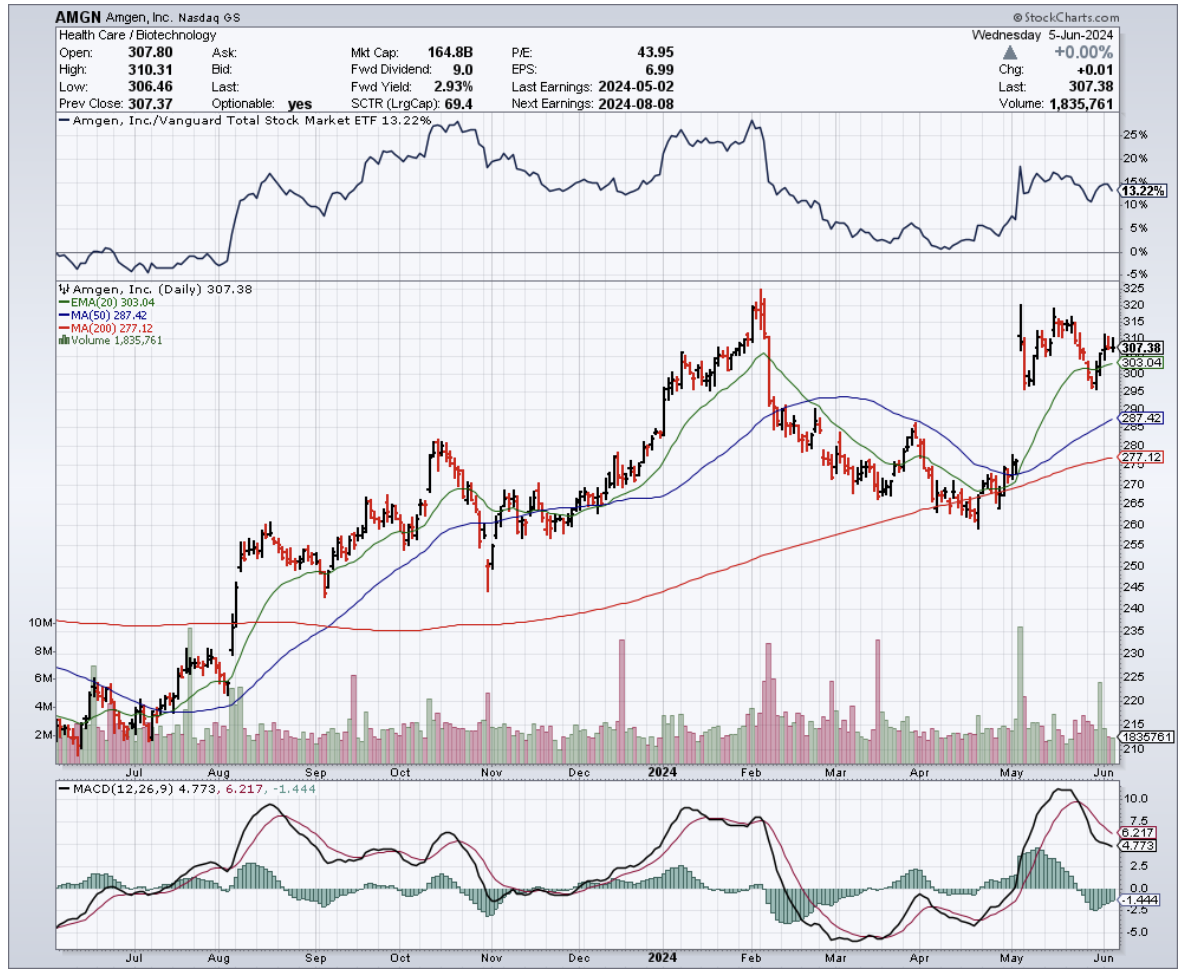The Tortoise In The Biotech Race That's About To Cross The Finish Line
You know how every golfer dreams of donning the green jacket at the Masters, every chess player longs for the title of Grandmaster, and every football player fantasizes about hoisting the Lombardi Trophy?
Well, healthcare and biotech companies have their own version of the ultimate dream: launching a product that's as successful as the latest weight loss drugs from Eli Lilly (LLY) and Novo Nordisk (NVO).
These two pharma heavyweights have been on an absolute tear, with their shares skyrocketing 611% and 471% respectively over the past five years. It's the kind of rally that'll make your head spin and your wallet sing.
And guess what? The good news just keeps on coming. Analysts have cranked up their forecast for the obesity market. They're now predicting it'll hit a jaw-dropping $130 billion by 2030, up from their previous estimate of $100 billion.
That's an extra $30 billion. I don't know about you, but I call that a pretty sweet cherry on top.
Thanks to this obesity drug frenzy, Lilly has become the world's biggest healthcare company, and Novo Nordisk is now the most valuable company in Europe. It's like watching a couple of underdogs become the kings of the castle overnight.
Now, don't get me wrong, I love a good growth story as much as the next guy, and I wouldn't bet against Lilly or Novo Nordisk. But you know what I like even more? Biotech companies that are flying under the radar. The ones that are quietly innovating and positioning themselves for big things down the road.
That's where Amgen (AMGN) comes in.
I've been singing this company's praises in almost every piece I write, and for good reason. Amgen is one of the most innovative healthcare companies out there, with a massive product portfolio, a robust pipeline, and a balance sheet that's healthier than a triathlete on a kale smoothie diet.
Let me break it down for you. Established biotech companies with strong product portfolios are like fortresses in the business world.
They've got wide moats that are harder to cross than the Strait of Gibraltar. Why? Because bringing a new drug to market costs an arm and a leg.
We're talking anywhere from $314 million to $2.8 billion, depending on who you ask. That's not exactly chump change.
But Amgen? They've got it all figured out. Their portfolio spans a variety of therapeutic areas, including general medicine, oncology, inflammation, and rare diseases.
And in the first quarter of this year, these products helped Amgen rake in a whopping $7.4 billion in revenue, a 22% increase from the same period last year.
Key drugs like Repatha, Evenity, Blincyto, and Tezpire are leading the charge, with growth rates that'll make your head spin.
Repatha alone saw record sales of $517 million, thanks to a 44% increase in volume. And get this: expanded coverage and the removal of prior authorization requirements made the drug more accessible to patients.
It's like Amgen waved a magic wand and made all the red tape disappear.
Still, Amgen isn't just content with dominating the US market. They're taking their show on the road and expanding their international footprint.
Evenity, for example, has become the segment leader in Japan, capturing a staggering 46% of the bone builder market. And Uplinza, Amgen's fastest-growing biologic for a rare neurological disorder called neuromyelitis optica spectrum disorder (NMOSD), has been launched in multiple markets, including Canada.
Speaking of Uplinza, this little powerhouse came to Amgen via their $27.8 billion acquisition of Horizon last year. And let me tell you, it's paying off in spades.
In the first quarter of 2023, sales of Uplinza shot up by roughly 60%. And its smaller sibling, Tavneos, which targets a rare blood vessel disorder, saw a mind-boggling 122% growth.
The good news doesn't stop there. Amgen just released some hot-off-the-press Phase 3 data for Uplinza in another autoimmune condition, bringing it one step closer to yet another FDA approval.
This could put some serious pressure on competitors like Immunovant (IMVT) and argenx (ARGX), who have hit a few speed bumps lately.
Now, I know what you're thinking. "But John, what about the obesity market? Isn't that where the real action is?" Well, let me tell you, Amgen's got its fingers in that pie too.
They've got a unique obesity drug candidate called MariTide, which I talked about in detail last month, and the early clinical trial data suggests that it could blow Eli Lilly and Novo Nordisk's drugs out of the water.
But Amgen isn't just about cutting-edge drugs and international expansion. They're also rewarding their shareholders with cold, hard cash.
Last December, they hiked their dividend by 5.6%, and they're now paying out $2.25 per share every quarter.
That translates to a juicy 3% yield, and it's backed by a payout ratio that's lower than a limbo stick at a beach party.
Plus, Amgen's been raising its dividend like clockwork, with a five-year compound annual growth rate of 9.6% and 12 consecutive annual hikes. That's the kind of consistency that'll make any investor smile.
Overall, it’s clear that Amgen is a standout in the biotech world, plain and simple.
Besides, this company isn’t some Johnny-come-lately to the biotech game. They've been in this fight since the beginning, and their very name is proof of their founding principles. In fact, “Amgen” is a fancy-pants word for "applied molecular genetics."
That's right, when they picked that name back in 1980, they were already knee-deep in the groundbreaking science of genetic engineering, cooking up new therapies that would change the face of medicine as we know it.
So here’s my advice. When the chips are down and the stakes are high, you can never go wrong to bet on the OG of applied molecular genetics. Buy the dip on Amgen.


